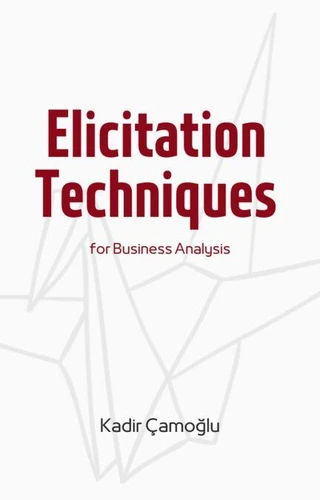Elicitation Techniques for Business Analysis
Par :Formats :
Disponible dans votre compte client Decitre ou Furet du Nord dès validation de votre commande. Le format ePub est :
- Compatible avec une lecture sur My Vivlio (smartphone, tablette, ordinateur)
- Compatible avec une lecture sur liseuses Vivlio
- Pour les liseuses autres que Vivlio, vous devez utiliser le logiciel Adobe Digital Edition. Non compatible avec la lecture sur les liseuses Kindle, Remarkable et Sony
 , qui est-ce ?
, qui est-ce ?Notre partenaire de plateforme de lecture numérique où vous retrouverez l'ensemble de vos ebooks gratuitement
Pour en savoir plus sur nos ebooks, consultez notre aide en ligne ici
- FormatePub
- ISBN8215012536
- EAN9798215012536
- Date de parution05/09/2022
- Protection num.pas de protection
- Infos supplémentairesepub
- ÉditeurWMG Publishing
Résumé
One of the most important prerequisites for a successful IT software project and the right software solution is to conduct an effective business analysis. A good business analysis is only possible with the right techniques. Especially to support analysts at the beginning of their careers, I have written the book "Necessities Revealing Techniques for Business Analysts" as a supporting reference to carry out successful business analysis studies by filtering over 25 years of software projects, software process consultancy, and corporate training experiences in a pot. The book contains the most common techniques used to reveal business analysis information, especially requirements.
Techniques are discussed in detail with the titles of what they are, how they are applied, success factors, and important points about use. What Will You Learn?. Elicitation. Document Analysis Technique. Interview Technique. Interface Analysis Technique. Focus Group Technique. Workshop Technique. Brainstorming Technique. Observation Technique. Prototyping Technique. Survey Technique. Reverse Engineering Technique Who should read this book?This target audience is anyone who performs analysis in software solutions, no matter what is written on the business card.
The following audiences will benefit most from this book:. Analysts. System Analysts. System Engineers. Requirements Engineers. Business Analysts. Process Analysts. Web Designers. User Experience Designers. Developers. Test Experts. Project Managers. Demand Managers. Service Managers. Consultants. Solution Developers. Product Managers. Scrum Masters
Techniques are discussed in detail with the titles of what they are, how they are applied, success factors, and important points about use. What Will You Learn?. Elicitation. Document Analysis Technique. Interview Technique. Interface Analysis Technique. Focus Group Technique. Workshop Technique. Brainstorming Technique. Observation Technique. Prototyping Technique. Survey Technique. Reverse Engineering Technique Who should read this book?This target audience is anyone who performs analysis in software solutions, no matter what is written on the business card.
The following audiences will benefit most from this book:. Analysts. System Analysts. System Engineers. Requirements Engineers. Business Analysts. Process Analysts. Web Designers. User Experience Designers. Developers. Test Experts. Project Managers. Demand Managers. Service Managers. Consultants. Solution Developers. Product Managers. Scrum Masters
One of the most important prerequisites for a successful IT software project and the right software solution is to conduct an effective business analysis. A good business analysis is only possible with the right techniques. Especially to support analysts at the beginning of their careers, I have written the book "Necessities Revealing Techniques for Business Analysts" as a supporting reference to carry out successful business analysis studies by filtering over 25 years of software projects, software process consultancy, and corporate training experiences in a pot. The book contains the most common techniques used to reveal business analysis information, especially requirements.
Techniques are discussed in detail with the titles of what they are, how they are applied, success factors, and important points about use. What Will You Learn?. Elicitation. Document Analysis Technique. Interview Technique. Interface Analysis Technique. Focus Group Technique. Workshop Technique. Brainstorming Technique. Observation Technique. Prototyping Technique. Survey Technique. Reverse Engineering Technique Who should read this book?This target audience is anyone who performs analysis in software solutions, no matter what is written on the business card.
The following audiences will benefit most from this book:. Analysts. System Analysts. System Engineers. Requirements Engineers. Business Analysts. Process Analysts. Web Designers. User Experience Designers. Developers. Test Experts. Project Managers. Demand Managers. Service Managers. Consultants. Solution Developers. Product Managers. Scrum Masters
Techniques are discussed in detail with the titles of what they are, how they are applied, success factors, and important points about use. What Will You Learn?. Elicitation. Document Analysis Technique. Interview Technique. Interface Analysis Technique. Focus Group Technique. Workshop Technique. Brainstorming Technique. Observation Technique. Prototyping Technique. Survey Technique. Reverse Engineering Technique Who should read this book?This target audience is anyone who performs analysis in software solutions, no matter what is written on the business card.
The following audiences will benefit most from this book:. Analysts. System Analysts. System Engineers. Requirements Engineers. Business Analysts. Process Analysts. Web Designers. User Experience Designers. Developers. Test Experts. Project Managers. Demand Managers. Service Managers. Consultants. Solution Developers. Product Managers. Scrum Masters









